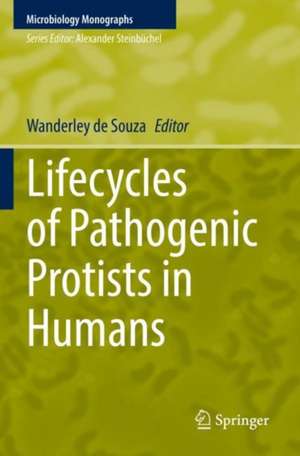Lifecycles of Pathogenic Protists in Humans: Microbiology Monographs, cartea 35
Editat de Wanderley de Souzaen Limba Engleză Paperback – 2 feb 2023
The book employs light and electron microscopy to display the changing morphology in various stages of parasitic development. In turn, the results are supplemented by transcriptome and proteome profiles that help to describe how these changes take place on a molecular level. Both researchers and clinicians from tropical medicine will find essential and practically applicable background information on these increasingly important pathogens.
| Toate formatele și edițiile | Preț | Express |
|---|---|---|
| Paperback (1) | 1123.50 lei 6-8 săpt. | |
| Springer International Publishing – 2 feb 2023 | 1123.50 lei 6-8 săpt. | |
| Hardback (1) | 1129.83 lei 6-8 săpt. | |
| Springer International Publishing – feb 2022 | 1129.83 lei 6-8 săpt. |
Din seria Microbiology Monographs
- 18%
 Preț: 953.82 lei
Preț: 953.82 lei - 5%
 Preț: 1594.75 lei
Preț: 1594.75 lei - 18%
 Preț: 956.33 lei
Preț: 956.33 lei - 18%
 Preț: 951.29 lei
Preț: 951.29 lei - 18%
 Preț: 952.09 lei
Preț: 952.09 lei - 18%
 Preț: 1224.36 lei
Preț: 1224.36 lei - 18%
 Preț: 939.00 lei
Preț: 939.00 lei - 18%
 Preț: 1547.49 lei
Preț: 1547.49 lei - 18%
 Preț: 946.41 lei
Preț: 946.41 lei - 18%
 Preț: 1224.68 lei
Preț: 1224.68 lei - 18%
 Preț: 947.35 lei
Preț: 947.35 lei - 15%
 Preț: 645.47 lei
Preț: 645.47 lei - 18%
 Preț: 1227.21 lei
Preț: 1227.21 lei - 18%
 Preț: 941.05 lei
Preț: 941.05 lei - 18%
 Preț: 946.55 lei
Preț: 946.55 lei - 18%
 Preț: 945.62 lei
Preț: 945.62 lei - 18%
 Preț: 1112.15 lei
Preț: 1112.15 lei - 18%
 Preț: 955.70 lei
Preț: 955.70 lei - 18%
 Preț: 944.19 lei
Preț: 944.19 lei - 18%
 Preț: 954.62 lei
Preț: 954.62 lei - 18%
 Preț: 950.66 lei
Preț: 950.66 lei - 15%
 Preț: 645.47 lei
Preț: 645.47 lei - 15%
 Preț: 643.34 lei
Preț: 643.34 lei - 18%
 Preț: 1225.94 lei
Preț: 1225.94 lei - 18%
 Preț: 947.04 lei
Preț: 947.04 lei - 18%
 Preț: 1113.58 lei
Preț: 1113.58 lei
Preț: 1123.50 lei
Preț vechi: 1370.12 lei
-18% Nou
Puncte Express: 1685
Preț estimativ în valută:
214.98€ • 224.46$ • 177.92£
214.98€ • 224.46$ • 177.92£
Carte tipărită la comandă
Livrare economică 04-18 aprilie
Preluare comenzi: 021 569.72.76
Specificații
ISBN-13: 9783030806842
ISBN-10: 3030806847
Pagini: 618
Ilustrații: VIII, 618 p. 10 illus. in color.
Dimensiuni: 155 x 235 mm
Greutate: 0.87 kg
Ediția:1st ed. 2022
Editura: Springer International Publishing
Colecția Springer
Seria Microbiology Monographs
Locul publicării:Cham, Switzerland
ISBN-10: 3030806847
Pagini: 618
Ilustrații: VIII, 618 p. 10 illus. in color.
Dimensiuni: 155 x 235 mm
Greutate: 0.87 kg
Ediția:1st ed. 2022
Editura: Springer International Publishing
Colecția Springer
Seria Microbiology Monographs
Locul publicării:Cham, Switzerland
Cuprins
Life Cycle of Pathogenic Protists: Trypanosoma Cruzi.- Progress in Research on African Trypanosomes: Highlights from an Exceptional Decade.- Leishmania and Their Vertebrate Host Cells.- The Actual Knowledge of the Biology of the Leishmania-Sandfly Vector Interaction.- Plasmodium: Vertebrate Host.- Cellular and Molecular Interactions of Plasmodium with Mosquito Vectors.- Cryptosporidium.- Toxoplasma Gondii: Asexual Cycle in the Intermediate Host.- Toxoplasma Gondii: Detailed Description of the Coccidian (Asexual and Sexual) Development and Oocyst Sporulation.- Entamoeba Histolytica and Entamoeba Dispar.- Cell Biology of the Life Cycle of Giardia Intestinalis.- Trichomonas Vaginalis: Lifestyle, Cellular Biology, and Molecular Mechanisms of Pathogenesis.
Notă biografică
Wanderley de Souza is Professor of Cell Biology and Parasitology at Rio de Janeiro Federal University, Rio de Janeiro, Brazil. He received a MD in 1974 and a PhD in 1978. He was a visiting scientist at Harvard University, Boulder University, Illinois University, Glasgow University, and Cinvestav in Mexico. During his career, he published over 600 papers in international journals, most of them dealing with parasites such as Trypanosoma cruzi, Leishmania, Toxoplasma gondii, Trichomonas vaginalis and Giardia lamblia. His focus of work has been the use of modern microscopy techniques (light, scanning and transmission electron microscopy) in association with biochemical, molecular and immunological techniques to analyze the structural organization of the protozoa as well as their interaction with host cells. He has been a member of the editorial board of several journals such as Acta Microscopica, BMC Microbiology, Experimental Parasitology, Frontiers in Immunology, Journal of Eukaryotic Microbiology, Micron, Parasitology International, Parasitology Research, among others. He edited several books, including one from the Microbiology Monographs series entitled “Structures and Organelles in Pathogenic Protists”. He has been president of several national and international scientific societies in the areas of Parasitology and Microscopy. He also occupied several administrative positions such as Rector of the North Fluminense State University, State Secretary for Science and Technology of Rio de Janeiro, Vice-Minister of Science and Technology of Brazil, and President of Finep, the main Brazilian agency that supports the establishment of scientific infrastructure in Brazil.
Textul de pe ultima copertă
This volume covers the most important parasitic protists that are known to infect humans. The pathogens discussed cause diseases like toxoplasmosis, malaria, cryptosporidiosis, leishmaniasis, amoebiasis, trichomoniasis, and giardiasis. Readers from microbiology will appreciate the special focus on protist cell biology. As demonstrated in several of the chapters, these parasites are characterized by peculiar structures and organelles that cannot be found in mammalian cells – even though both are eukaryotic.
The book employs light and electron microscopy to display the changing morphology in various stages of parasitic development. In turn, the results are supplemented by transcriptome and proteome profiles that help to describe how these changes take place on a molecular level. Both researchers and clinicians from tropical medicine will find essential and practically applicable background information on these increasingly important pathogens.
Caracteristici
Covers the most important parasitic protists infecting humans Illustrates parasitic life cycles with didactic schemes and electron microscopy pictures Provides research updates on parasitic protozoan cell biology Highlights unique characteristics in protozoan cell biology
